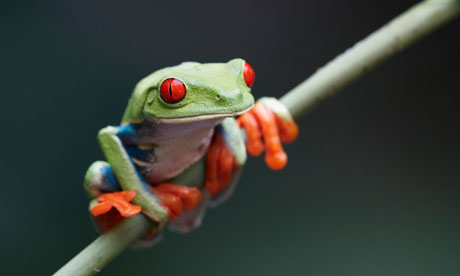TOP STORIES
Kiwi research to prevent and treat disease
New research by a Wildbase Hospital veterinarian will help combat the parasitic disease coccidiosis that affects kiwi in captivity. This comes as Wildbase announces a major ten-year partnership with Shell New Zealand that will significantly improve conservation outcomes for New Zealand.
Massey University wildlife veterinarian Kerri Morgan has learned valuable information about the parasite’s biology and how it interacts with kiwi that will now directly affect the conservation management of the species. The parasite infects the gastrointestinal and renal system and can result in death.
“We see and treat quite a few cases of coccidiosis at Wildbase and we recognised it was a major health problem in the conservation management of kiwi,” Ms Morgan says.
Common pesticides 'can kill frogs within an hour'
New research suggests the chemicals are playing a significant and previously unknown role in the global decline of amphibians
Widely used pesticides can kill frogs within an hour, new research has revealed, suggesting the chemicals are playing a significant and previously unknown role in the catastrophic global decline of amphibians.
The scientists behind the study said it was both "astonishing" and "alarming" that common pesticides could be so toxic at the doses approved by regulatory authorities, adding to growing criticism of how pesticides are tested.
‘Noah’s Ark’ to Save Tasmanian Devils from Cancer Plague
Australian scientists and wildlife experts have relocated a group of Tasmanian devils to an island “Noah’s Ark” in an attempt to protect them from an epidemic of contagious facial cancer that has been decimating the population.
The disease, which is spread through the animals’ bite, has wiped out 84 percent of all Tasmanian devils since first coming to scientists’ attention in 1996; some fear that it could obliterate the entire wild population within four decades.
OTHER WILDLIFE HEALTH RELATED NEWS
- Disease resistance is related to inherent swimming performance in Atlantic salmon
- Do Animals in Chernobyl’s Fallout Zone Glow?: The scientific debate about Europe’s unlikeliest wildlife sanctuary [Slate]
- Sandhill cranes may help solve puzzle of dwindling whooping crane population
- Monkeys Stressed from Longer Foraging Times
- Survey finds key Arizona bighorn sheep herd still depleted [Arizona, USA]
- Pronghorns in peril along Arizona-Mexico border
- MINE TRAFFIC CAUSES SPIKE IN KOALA CASUALTIES
- Paving paradise? Effects of the urban interface on wildlife [Kenai Peninsula if Alaska, USA]
- Red Tide Spotted in Manatee, Sarasota Counties [Florida, USA]
- Red tide presence strengthens along Naples beaches, but fish kills decline [Florida, USA]
- DuPage to test for deer-killing disease [DuPage Co., Illinois, USA]
- Taxidermists join CWD surveillance effort [Wisconsin, USA]
- Deer population all but eliminated where CWD was found [Iowa, USA]
- Another case of Chronic Wasting Disease in Macon County [Macon Co., Missouri, USA - Map It
 ]
]






No comments:
Post a Comment